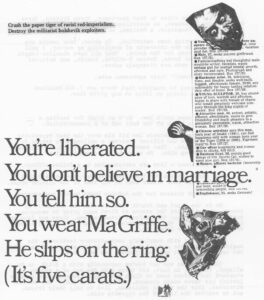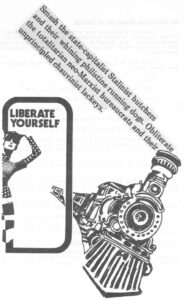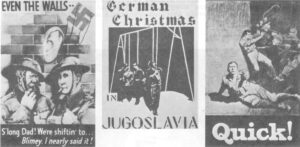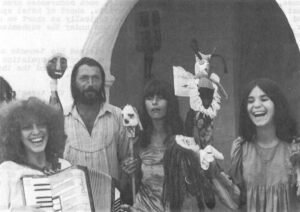Halloween, 1972 Somewhere-in-Europe
“After all, it’s not that awful — you know what the fellow said…In Italy for thirty years under the Borgias they had warfare, terror, murder, bloodshed — they produced Michaelangelo, Leonardo da Vinci and the Renaissance. In Switzerland they had brotherly love, five hundred years of democracy and peace, and what did they produce…? The cuckoo clock. So long, Holly.”
— Orson Welles in The Third Man
 In any intrepid quest for (flourish of trumpets) The Truth, or even a desultory glance around for (fanfare of flutes) A Story, one comes across a welter of details, incidents and anecdotes which, while seemingly disconnected from the course of current events, nevertheless emit an aura of importance.
In any intrepid quest for (flourish of trumpets) The Truth, or even a desultory glance around for (fanfare of flutes) A Story, one comes across a welter of details, incidents and anecdotes which, while seemingly disconnected from the course of current events, nevertheless emit an aura of importance.
One is certain that this detritus of inquiry has significance in the larger Scheme of Things, but just how this relationship manifests itself is, too often, elusive. (The writer notes here-with, in the interests of credibility, that the word “one” is used in an effort to convey a probably false sense of objectivity, existing as it does at a polite — but synonymous — remove from the more extravagant “I” and breast-beating “me.”)
Such details as are hinted at above may be completely irrelevant, or they may foreshadow profound shifts in the course of history. It is the criminally negligent reporter who fails to report the presence of, for instance, smirks at the SALT talks.
And yet, bound by editorial convention and readership mores, the journalist is unable to report phenomena of that kind unless there is simultaneously a larger Story in which the detail may inhere. The following, then (with the exception of a short essay on Time, capitalism, Marxism, economics and the Bronze Age) is a collection of details that have so far gone unreported for want of a story willing to accept them. (Parenthetically, it might be helpful to point out that the epigraph on page one has little or no known relevance to the reading matter which it precedes; it is, nevertheless, a nice hefty epigraph and may lend some needed weight to what follows.)
1. The Word
Carlos (this is his real name) reads and smiles a lot.
An Argentine, he’s spent four years in tenacious pursuit of Enlightenment, crossing Europe, India, and the Middle East, changing gurus with the fickle elan of a Prom Queen alternating suitors. Despite the frequency of these alterations, he is deadly serious about his quest. He knows Enlightenment is out there (or, depending on his mentor, in there).
There is one subject about which the usually phlegmatic Carlos gets incensed: the Divine Light Mission or, as Carlos calls it, them.
The Divine Light Mission is a rapidly growing religious sect using oriental meditation practices alleged to bring an individual closer to God. Or something worthy of capitalization. The group is hierarchically organized beneath a precocious 14-year-old autocrat of’perhaps divine, but certainly Indian, derivation. It has been financially successful and recruited a large international following of young seekers-after-truth.
Carlos: “I was walking through Hyde Park in London. I hadn’t eaten in a few days and all my clothes were wet from rain. Suddenly, this man jumps out from behind a tree and points a finger at me. ‘You!’ he said. ‘You need a job! Come with me.’ Outa sight! I needed a job. So I went with him. He said I’d work for the Divine Light Mission, typing stuff, and that I’d be paid a lot. I don’t remember how much exactly. So I went to work. But I never really got paid very much. There were always donations that you had to make to one thing or another.” Carlos assumes a mock falsetto voice (which is strange, given his Argentine accent):
“’0h, the Guru needs this, the Guru needs that! Give us some money for the Guru! It is so-and-so’s birthday, we need some money for a present!’ Every day this went on, and I wound up working for food.
“But, anyway, one day I went to see the Guru. There were dozens of us waiting outside his house in a very posh district of London. We waited in the rain. No Guru. They kept telling us to go away. After a few hours, the man who’d told us to go away came out and said the Guru would pass by us soon. But, he said, don’t under any circumstances, fall to the ground and kiss his feet becauses it disturbs the neighbors and they complain.”
Carlos chuckles, getting this weight off his chest. “And his house — such an expensive house! In India I’ve seen people so hungry they are eating dirt. Anyway, inside the house is a big color television set and, as the Guru watches this, his disciples switch the channels — this, one of them told me, shows non-attachment.” Carlos cackles.
“I will tell you their secret,” he says, “the secret Word they guard so closely that only the initiates among them know it. I will tell you the Word, you will put it in your newspaper, and all the world will know it. They will go crazy!” Carlos pauses and looks around. “The secret Word,” he whispers, “is — “
KAH-WUNCH! An untranslatable sound bursts from his mouth.
“That,” he says with great satisfaction, “is the secret Word.”
It is made, he explains, by blowing air across the tongue as the latter wags near the roof of the mouth. “Now everyone will have the power conferred by the Word. This is democracy. All hell will break loose,” he says, and laughs wildly.
2. Politics
A Dutch government official, conversing over coffee in the early hours of the morning:
“I’ve fought in several wars: in Europe and in Africa. I’m a communist. But the Communists don’t think I’m a communist. They think I’m a liberal. Because I am not in the Communist Party. Why, you ask, if I am a communist, am I not in the Communist Party? Because these communists — they are not real communists. They are paper communists, collaborators. Naturally, then, you would expect me to join the Labor Party. But the Labor Party doesn’t represent the interests of the workers. It’s a sham, like the Communist Party! So I belong to the Pacifist Party.”
He pauses and then confides: “However, personally I am not a pacifist…. You understand my meaning….
3. The Game
It is a large house in London’s Dalston neighborhood, a rather shabby part of town peopled by hard workers, the unemployed, pensioners, a handful of winos, and more than a smattering of young drop-outs.
Seven people, all between twenty and thirty, move from conference to conference in the house. Of the seven, two are anarchists, one is a Pabloite Trotskyist, three are Marxist-Leninists, and one is a reporter.
 The reporter has been interviewing Nick and Lenny (maybe their real names, maybe not), the anarchists, who are manufacturing machine-guns for distribution to the disaffected. The machine-guns are .22 calibre because, as Nick points out, “If you wound someone, it takes three people out of action — the bloke you hit, and two people to help him.” The guns cost about $6 each to make, and there is no mark-up. That, however, is neither here nor there.
The reporter has been interviewing Nick and Lenny (maybe their real names, maybe not), the anarchists, who are manufacturing machine-guns for distribution to the disaffected. The machine-guns are .22 calibre because, as Nick points out, “If you wound someone, it takes three people out of action — the bloke you hit, and two people to help him.” The guns cost about $6 each to make, and there is no mark-up. That, however, is neither here nor there.
The seven people are conferring with each other because they are playing “Diplomacy,” a complicated strategy game played on a garish board manufactured by a firm called “Intellectual Diversions.” The purpose of the game is to rule the world.
The game has been proceeding erratically. The seven have been playing for six hours, and the end is nowhere in sight. The balance of power rests upon bedrock. The anarchists keep precipitating unnecessary conflicts, attacking the others at random. The Pabloite refuses to move. The Marxist-Leninists relentlessly ask for more time to confer.
The reporter has been bugging a conference between the Pabloite and one of the anarchists. He does this with a glass placed against the wall, and his ear placed against the glass. The glass has been provided by one of the Marxists. Treacherous Marxist.
“What are they saying?” the Marxist wants to know. The reporter shrugs. “They’re not talking,” he says. Treacherous reporter! In the next room, the Pabloite tells the anarchist: “I have no designs upon Russia.” Treacherous Trot!
The anarchist says, “Me either.” Treacherous anarchist!
4. The Deal (War On Drugs Division)
“Wanta score some acid, man?”
“Sorry, no bread.”
Both these people are lying. The first is a known rip-off artist and doesn’t have any acid; the second is carrying more than $50 on him. Nevertheless, there is a momentary conspiratorial bond between the two of them.
5. The Merchant
Felix Dennis is editor and (with Richard “Play Power” Neville) co-owner of Oz.
Oz is the largest and slickest of Europe’s “underground” publications. Its circulation, according to Felix, is “about 80,000.” Felix, incidentally, denies that Oz has ever had an editor but, if you watch him at work, you’ll agree that Felix fulfills that function quite efficiently — whatever he calls it.
Oz is also one of the best undergrounds around. It avoids the internal squabbling that has ruined so many alternative publications, and looks upon New Left rhetoric with the same apprehension that a surgeon might experience upon learning that he has Parkinson’s Disease.
Oz-politik, while distinctly anti-Establishment, is primarily cultural, owing more to the insights of the Provos than to the formulations of Marx. Banking everything upon the impact of style and idea, rather than upon any coherent analysis, Oz is consistently provocative and generally offensive.
Despite the success of his magazine, Felix is not without despair. For 10 years or more a generation of young people has tried to re-vamp the world and what’s come of it? Nixon, the Tories, and Grand Funk Railroad.
“We blew it,” Felix says. “The underground press blew it, and the kids blew it. What counter-culture? Where is it? What has it produced, or done, or changed?” He pauses, glancing around with a manic gleam.
“And yet, what else could we have done? We did what we did, we did all we could, but we failed. What else could we have done, for god’s sake?”
Nevertheless, life must go on. The Left may be entering a period of stagnation and uncertainty, but that is not the end of the world. It has happened before. Oz must endure, the magazine must go on. Felix Dennis must go on.
“It’s a capitalist society,” Felix remarks, and confesses to having had a bright idea. Oz will manufacture plastic effigies of Art Crumb’s “Honeybunch Kaminski” and sell them to its readers.
The reproductions will be yet another addition to the publication’s ever-expanding mail order line. Already that line includes:
posters;
records;
patchouli oil;
Tarot cards;
soapstone chillums;
comics;
waterbeds;
incense;
illustrated prayers;
T-shirts;
guidebooks;
drawings;
back-issues;
and copies of R.D. Laing’s “Knots.”
“The underground press is dead,” Felix says. “Rock-and-roll is over, too. But look at all that beautiful, raw energy that goes down at the football matches and other games. I think sports will replace whatever it is that we have now. I don’t know how it will develop — but who could have predicted, back in the Thirties, the kind of culture that would evolve out of the early bands? That’s where it all started, and we wound up with rock-and-roll. I don’t know what’s going to happen, but blood-sports are where it’s at in the future….”
6. A Fact
On the island of Formentera, roughly equidistant from Algiers and Barcelona, a former American prostitute lives alone in the branches of a tree. It is a fig tree, and she descends from it only for parties, necessities, and brief swims in the Mediterranean. The remainder of her time is spent in transcendental meditation. The American Embassy in Madrid, to the best of my knowledge, is ignorant of her presence, and her role in the greater Scheme of Things is, for the present, unclear. She does not grant interviews.
7. Demography Debunked: Results of a Survey
Given: that there are 50,000 human beings who consciously identify themselves as “freaks” living at any particular time on Ibiza. What nationalities do they represent? And in what numbers?
This is not an impossible task. A rough solution may be obtained by the surveyor if he spends the afternoon driving between Ibiza-town and Santa Eulalia, picking up hitch-hikers and recording their nationalities accurately.
By 5 p.m., the task has gone well.
I have given rides to four Americans, three Britons, three Germans, two Frenchmen, an Australian, a Swiss, two Dutchmen, an Italian, three Canadians, a Mexican, an Argentine, and a Dane.
I am returning home satisfied. Up ahead, four people are hitch-hiking. In the interests of completing my survey, I pull over, and they rush for the doors. They all have shoulder-length black hair, faded Levis, Motown T-shirts, beards, and battered sandals. Their eyes are strangely askew.
“You Amelican?” their spokesman asks.
I am forced to conclude that there are 7,400 Mainland Chinese hippies living on Ibiza at any given time.
8. Mark VII
His real name isn’t Lew. He’s on trial for beating a policeman with a brick at the tail end of a demonstration.
The policeman contends Lew hit him over the head repeatedly with a brick while the officer assisted a colleague in trying to arrest someone else. That someone else, unidentified, is sitting in the court at my side. He says the policeman is lying.
The policeman’s lies are corroborated by a fellow officer.
The first witness for the defence proves conclusively that the defendant was four blocks away at the time of the alleged crime.
The second witness for the defence backs up his predecessor.
 So do the third and fourth witnesses for the defence. My source, who witnessed the events at first hand prior to escaping, confides in a whisper that defence witnesses one, three and four are lying unashamedly. What about defence witness two? “I don’t know who he is, but he’s lying too.”
So do the third and fourth witnesses for the defence. My source, who witnessed the events at first hand prior to escaping, confides in a whisper that defence witnesses one, three and four are lying unashamedly. What about defence witness two? “I don’t know who he is, but he’s lying too.”
Confronted with completely contradictory testimony, the magistrate finds the accused guilty of a lesser charge and suspends the sentence. As it happens, justice has been done.
The policeman was not beaten repeatedly with a brick, as he alleged, but was, in fact, hit twice with the end of a wooden standard theretofore used to fly a red flag. The policeman lied to justify his three month absence, with pay, from work. The defence witnesses, like the second policeman, lied to help their friend, and to counter the lies of the opposite side.
Prior to leaving court, nearly everyone involved is smirking. It is apparent that the details of actual incident are known to everyone but the judge and the barristers. “God save the Queen,” bellows a petty official.
9. There Will Always Be An England
Consumer skepticism and working-class inscrutability divide tne poor in daily displays of bad faith and failed communication. The following conversation, between a barmaid and a customer whose cup did not overfloweth, is transcribed verbatim:
“Just who do I see about this, then? Just who do I see about this?”
“?”
“Just tell me who do I see about this, then?”
“Are you clockwork? What’s all this, then?”
(GESTURING) “Just who do I see about this?”
“Well, that’s an oversize glass, i’n’ it, love?”
“Oversize? Oversize? Oversize-, is it? Who says so?”
“It says right there on the wall, mate. Now this,” says the barmaid triumphantly flourishing another glass, “is a half-pint, isn’t it? That’s an oversize glass you’ve got there, love.”
“Who do I see about this? Just tell me who I see about this.”
“I’ll show you. I’ll pour your’s into this half-pint glass and you’ll see.” She does so. It comes exactly to the top.
“Well, you shouldn’t ought to use those glasses, then, should you? Deceives the customer, then, doesn’t it?”
“Sometimes we run out of the other ones, don’t we?”
“I apologize. I do apologize, love. Now let me alone so I can drink the bloody half-pint.”
10. There Will Always Be An Amsterdam
According to a poll of customers in Madame Tussaud’s waxwork museum in Amsterdam, Richard Nixon has replaced Hitler as the museum’s most frightening figure.
11. Deep Stuff
Generally speaking, leisure has historically been the province of the rich.
As an individual’s wealth increased, so did his access to leisure. Conversely, a diminution of wealth usually led to a corresponding decrease in available leisure.
It is from this general equation, this relationship between capital and leisure, that the cliche “Time is money” derives its truth. In recent years, however, groups of malcontents, dressing oddly and affecting unusual modes of dress and styles of speech — to wit, hippies — have assaulted the equation and cliche by proceeding to exploit leisure without first accumulating money. Predictably, this has offended the more conservative among us who tend to view leisure as something one earns.
 The reason for this latter view dates to neolithic times when primitive tribesmen were compelled by hunger to hunt for food. One who did not hunt food, but ate what was acquired, was considered a ne’er-do-well and drummed out of the tribe. This was a practical matter (for food was scarce in those days) and little or no offence was meant. It was a happy hunter who could kill a large animal and thereby have enough food for a long period of time. He was then free to goof off since it would be wasteful for him to kill more than he could eat. In those days (measured by the tides) people used to say, “Time is food.” It was a popular cliche and may even have been the first.
The reason for this latter view dates to neolithic times when primitive tribesmen were compelled by hunger to hunt for food. One who did not hunt food, but ate what was acquired, was considered a ne’er-do-well and drummed out of the tribe. This was a practical matter (for food was scarce in those days) and little or no offence was meant. It was a happy hunter who could kill a large animal and thereby have enough food for a long period of time. He was then free to goof off since it would be wasteful for him to kill more than he could eat. In those days (measured by the tides) people used to say, “Time is food.” It was a popular cliche and may even have been the first.
As man’s opposing thumbs grew ever busier and more skilled, his technology increased and his labors diversified. It was at about this time that money became exchangable for food and the cliche “Time is food” metamorphosed into its more generalized formulation, “Time is money.”
Today, however, the wonderful pageant of mankind has need of even newer cliches. Thanks to the evidence offered by countercultural life-styles, time is no longer money. Today, time is only time.
Let us examine this bizarre notion for a moment.
While time may once have been food and money, many was the capitalist who shuddered to hear the counter-cliche, “You can’t take it with you.” To die with a lot of money was to have been cheated of its use and, therefore, of the substantial amounts of spare time one had earned.
Small shopkeepers with only $200 in the bank at date of decease had little to complain about. But what of the millionaire who left $200,000 — he was gypped of more than 300 two-week vacations, all expenses paid, in the Bahamas. Thus began the the strange history of inheritance.
Upon passing away, a father would leave his accumulated assets of money/time to the person of his choice, usually the first son (who was believed to possess greater chromosomal fidelity than subsequent progeny, a quirk in the history of genetics). Thus, scions of large fortunes would suddenly be possessed of massive amounts of “free” leisure time afforded by their inheritance. There was no blame in this, as the I Ching astutely notes. The money, and of course the time, while not earned by its new owner, had been originally obtained in the conventional way. It was accounted for, in a sense, and order prevailed. It was as if the heir had suddenly had his life expectancy doubled or tripled by his fortunate relationship to to the right parent.
It might be helpful to note here the role of private property.
Private property is acquired by exchanging money for an object one desires. Since the money was earned by converting leisure time to labor in order to obtain the money with which to buy the object, it may be said that private property — like food and subsequently money — is also time. In capitalist societies most property is private and an attack upon it is usually treated as seriously as an attack upon someone’s person. To steal someone’s property is to thieve a portion of his time, to rob him of a part of his life. Naturally, some properties are more valuable than others. A simple pair of andirons, for instance, may only represent a tinker’s dam (smallest unit of time after the second). Some paintings, however, are worth all the tea in China (roughly equivalent to an eon), and it is this aspect of art to which we refer when we describe a work as “timeless.”
The role of any individual in a society is largely determined by his relationship to time. Thus, prisoners “do time,” financiers “spend time,” and hippies, assaulting the essence of the system, “kill time.”
All capitalist societies are organized around the notion of “investment.” Investment is an act whereby one buys a property in the belief that it will become more valuable as time elapses. Ordinarily, such a practice would seem to be a contradiction in terms: how can one accumulate more and more time by spending it? In practice, however, investment works so long as time is infinite and the investment may grow indefinitely (this is the basis of imperialism).
A “good investment, therefore, is one in which one’s money increases over the years. A bad investment is one in which one’s money decreases over the years.
Thus, a bad investment “loses time.” A mediocre investment “marks time.” A diversionary investment is a way of “buying time.” A good investment “gains time.” And a great investment is a joy forever.
The intrepid reader may well wonder what all this has to do with the “hippies” mentioned earlier. Briefly, times have changed, as the saying goes, and it may now be said that time is no longer food, money, or private property. Today, time is only time.
It is, thanks to automation, “on our hands.”
Youths possessed of massive amounts of leisure time while simultaneously being neither heirs nor gainfully employed indicate that a profound change has taken place within society.
Karl Marx, a 19th-Century reporter who devoted his life to capitalism, writing several thick books about it, often groused that things were unfair. He urged the poor, people who were unable to accumulate spare time, to spend whatever time they had “seizing the means of production.” In that way, Mr. Marx believed, they would indirectly seize the means of leisure. They would get it from the rich whom Mr. Marx believed had too much time on their hands.
As Marx’s followers have pointed out, 3 percent of the American population controls 60 percent of the spare time known to exist. If this resource were redistributed, everyone, except the rich, would have an extra two weeks in which to goof off. The rich would lose about 40 years each.
This was considered quite revolutionary at the time, and journalist MMarx was labelled a “red,” and his books were removed from libraries in Orange County, California and Dallas, Texas.
Today, however, hippies have decided to bypass the means of production and have gone after leisure more directly. They have, in a meaningful sense, seized the time. In doing so, they have returned to what they believe is a more “natural” way of living. This natural way of life, nomadic, serene, contemplative, and indolent, is very similar to the days when time was food. The hippies seem to believe that participation in modern society constitutes a “bad investment” (as defined above) in that the price of leisure is greater today than it ever was. In a hunting and gathering society time may be food, but food was more available then than money is today.
The resentment directed at the hippies is considerable.
Few people quarrel with their ends. Everyone would like to have all that leisure time to read, watch television, swim, play frisbee, consult the I Ching, expand consciousness, and engage in other pursuits indigenous to the hippies. But they can’t, they haven’t got the time, and they resent it. So their quarrel lies, not with the hippies’ ends, but with their means.
Usually this quarrel is articulated by the notion that the hippies “have no visible means of support” and are, therefore, “bums.”
The appellation “bums” differentiates hippies, who have not earned their spare time, from heirs who have acquired their leisure by inheritance. To the poor, the hippy represents an anomaly in the order of the universe since he is possessed of excess time with nothing to support it but his will to do so. He is seen, in other words, as a “freak,” an alien from another dimension.
To the wealthy man, who has worked long and hard for his money and time, or inherited it, the hippy represents an insidious and well-defined threat to his wealth: unearned leisure is, to the rich, a counterfeiting of time: their own fortunes are necessarily cheapened or diminished by it.
As a consequence of this problem, which is at the root of many others, America is today divided. Obviously, so long as time is only time, animosity will be generated. When time once again becomes money, harmony will prevail, and materialism will again flourish.
Received in New York on November 27, 1972
©1972 Jim Hougan
Jim Hougan is an Alicia Patterson Foundation award winner on leave from The Capital Times (Madison, Wis.). This article may be published with credit to Mr. Hougan, The Capital Times, and the Alicia Patterson Foundation.








